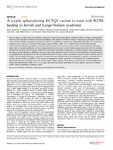A cryptic splice-altering KCNQ1 variant in trans with R259L leading to Jervell and Lange-Nielsen syndrome

Ver/
Use este enlace para citar
http://hdl.handle.net/2183/30985Coleccións
- GI- GRINCAR - Artigos [226]
Metadatos
Mostrar o rexistro completo do ítemTítulo
A cryptic splice-altering KCNQ1 variant in trans with R259L leading to Jervell and Lange-Nielsen syndromeAutor(es)
Data
2021-03-04Cita bibliográfica
Torrado M, Fernández G, Ganoza CA, Maneiro E, García D, Sonicheva-Paterson N, Rosa I, Ochoa JP, Santomé L, Vasichkina E, Monserrat L. A cryptic splice-altering KCNQ1 variant in trans with R259L leading to Jervell and Lange-Nielsen syndrome. NPJ Genom Med. 2021 Mar 4;6(1):21. doi: 10.1038/s41525-021-00183-y. PMID: 33664273; PMCID: PMC7933243.
Resumo
[Abstract] Here we report an infant with clinical findings suggestive of Jervell and Lange-Nielsen syndrome (JLNS), including a prolonged QT interval (LQTS) and chronic bilateral sensorineural deafness. NGS analysis revealed one known heterozygous pathogenic missense variant, KCNQ1 p.R259L, previously associated with LQTS but insufficient to explain the cardioauditory disorder. In a screening of proximal intronic regions, we found a heterozygous variant, KCNQ1 c.1686-9 T > C, absent from controls and previously undescribed. Several splicing prediction tools returned low scores for this intronic variant. Driven by the proband's phenotype rather than the neutral predictions, we have characterized this rare intronic variant. Family analysis has shown that the proband inherited the missense and the intronic variants from his mother and father, respectively. A minigene splicing assay revealed that the intronic variant induced an additional transcript, arising from skipping of exon 14, which was translated into a truncated protein in transfected cells. The splice-out of exon 14 creates a frameshift in exon 15 and a stop codon in exon 16, which is the last exon of KCNQ1. This mis-spliced transcript is expected to escape nonsense-mediated decay and predicted to encode a truncated loss-of-function protein, KCNQ1 p.L563Kfs*73. The analysis of endogenous KCNQ1 expression in the blood of the proband's parents detected the aberrant transcript only in the patient's father. Taken together, these analyses confirmed the proband's diagnosis of JLNS1 and indicated that c.1686-9 T > C is a cryptic splice-altering variant, expanding the known genetic spectrum of biallelic KCNQ1 variant combinations leading to JLNS1.
Versión do editor
Dereitos
Atribución 3.0 España
ISSN
2056-7944






